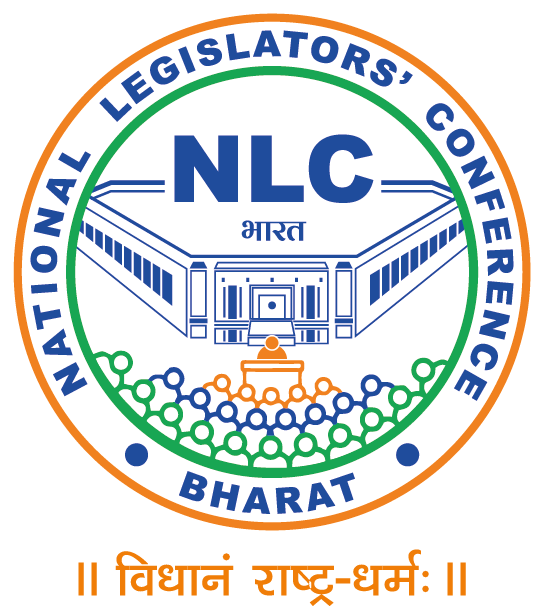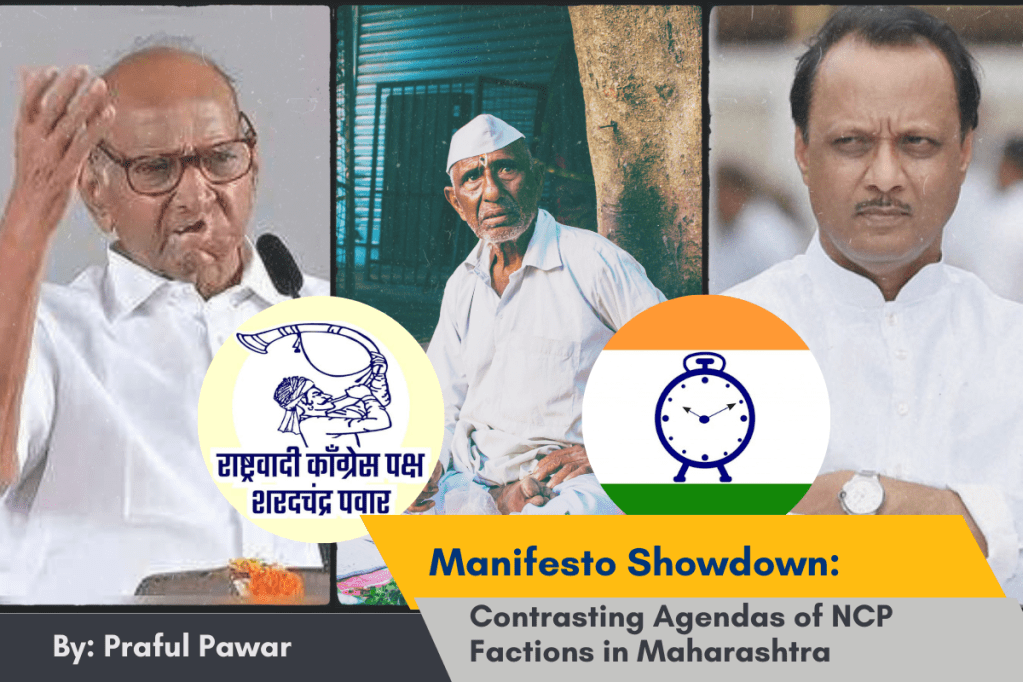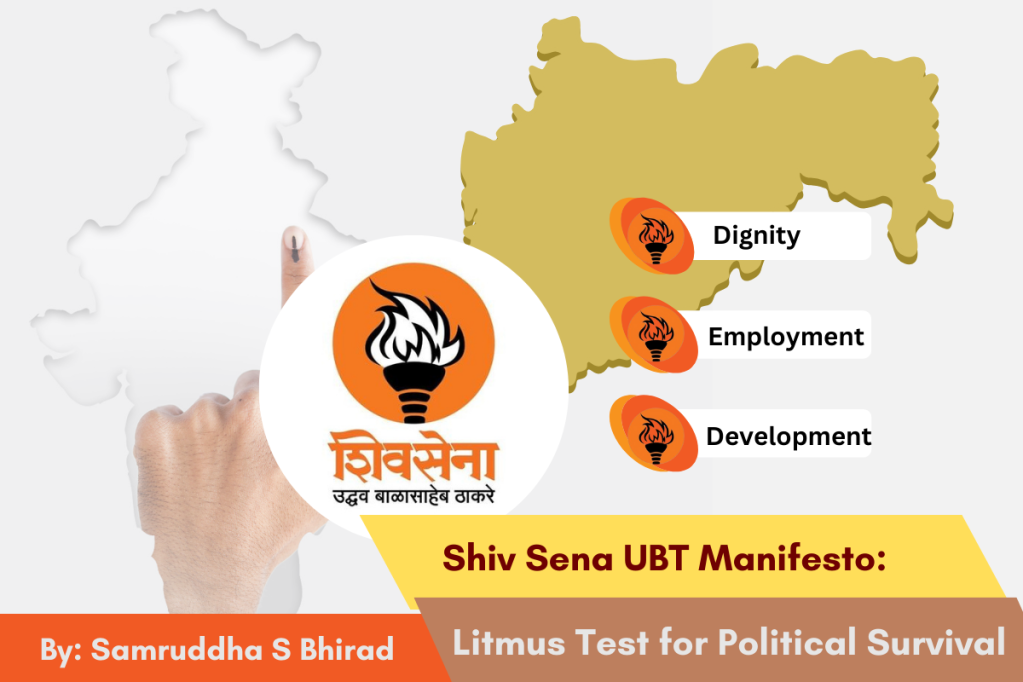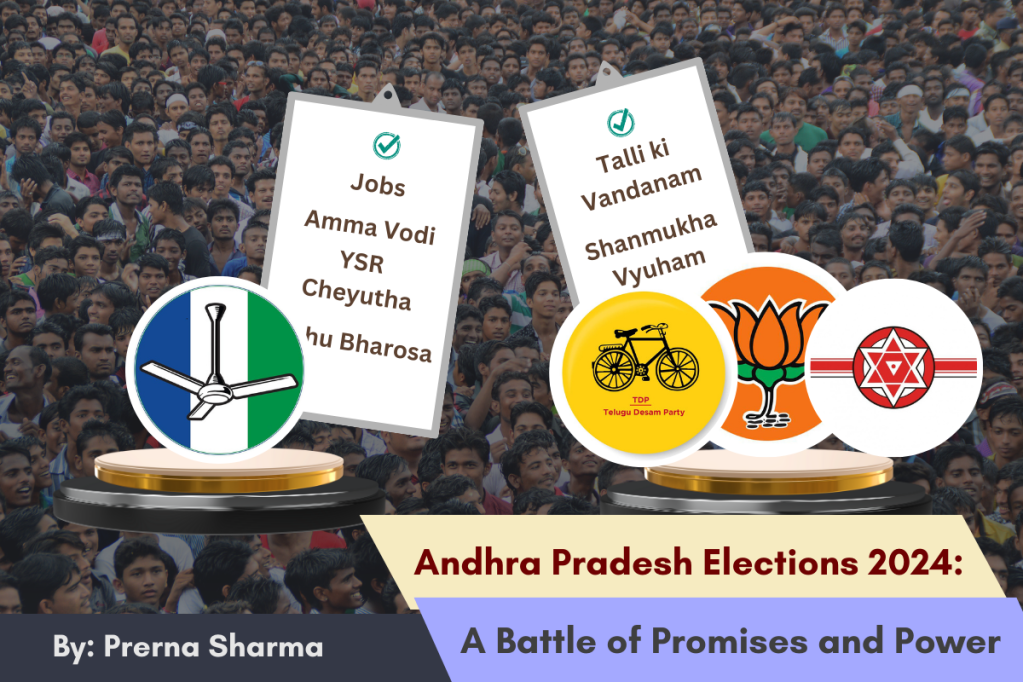Maharashtra has been politically important for India since independence. The state has produced notable leaders like Yashwantrao Chavan, Shankarrao Chavan, Sharad Pawar, Nanaji Deshmukh and Pramod Mahajan who left a mark on the national politics. The state has also given the nation a President of the Republic, Speaker of Lok Sabha and numerous Union Ministers. It has led to the belief amongst the people of the state that ‘the road to Delhi goes through Maharashtra’. The state has 48 Lok Sabha seats, the second highest after Uttar Pradesh. Therefore, a party, or a coalition of parties, that aspires to come to power at the Centre, has to strive to get the maximum number of seats from Maharashtra.1
The Nationalist Congress Party (NCP), a significant political party in the state, finds itself divided into two factions, each aligned with different political alliances. One faction remains loyal to the original party’s leader, Sharad Pawar, and is aligned with the Shiv Sena led by Uddhav Thackeray and the Indian National Congress (INC) under the banner of the Mahavikas Aghadi (MVK). The other faction, led by Sharad Pawar’s nephew Ajit Pawar, is aligned with Eknath Shinde-led Shiv Sena and the Bharatiya Janata Party (BJP) under the name of Mahayuti.2
In the runup to the 19th Lok Sabha elections, both factions of the NCP have unveiled their manifestos, outlining their vision and priorities for governance. This blog analyzes the respective manifestos on numerous counts.
1. Caste-Based Census:
Ajit Pawar-led NCP: Emphasizes conducting a caste-based Census to ensure fair representation.
Sharad Pawar-led NCP: Shares a similar commitment to conducting a caste-based Census for targeted policy-making.
2. Minority Welfare:
Ajit Pawar-led NCP: Prioritizes minority welfare, ensuring opportunities for education, entrepreneurship, and employment. It demands semi-English status for Urdu medium schools in the state.
Sharad Pawar-led NCP: Resounding the emphasis on minority welfare, advocating for equal opportunities and rights for minority communities.
3. Social Justice and Inclusivity:
Ajit Pawar-led NCP: Upholds principles of equality and unity, focusing on bringing marginalized sections into the mainstream.
Sharad Pawar-led NCP: Shares a similar commitment to social justice and inclusivity, emphasizing equity and opportunities for all. Recognizes legal rights of LGBTQIA+ individuals, including marriage, adoption and healthcare access. Provide educator training on LGBTQIA+ issues and foster safe and supportive educational environments for LGBTQIA+ students.
4. Educational Reforms:
Ajit Pawar-led NCP: Proposes educational reforms to enhance the quality and inclusivity of education.
Sharad Pawar-led NCP: Advocates for extending the Right to Education (RTE) and abolishing unjust fees to ensure uninterrupted educational journeys.
5. Climate Change:
Ajit Pawar-led NCP: Addresses climate change, advocating for environmental sustainability and mitigation measures.
Sharad Pawar-led NCP: Commits to demanding comprehensive measures to combat climate change and secure the well-being of future generations.
6. Leadership Style:
Ajit Pawar-led NCP: Exhibits a pragmatic and alliance-focused approach, considering coalition dynamics with the BJP and Shiv Sena.
Sharad Pawar-led NCP: Prioritizes broader ideological principles while maintaining the party’s independence and integrity.
7. Focus Areas:
Ajit Pawar-led NCP: Focuses on Maharashtra-specific issues and priorities, considering the party’s influence in the state.
Sharad Pawar-led NCP: Adopts a broader national perspective, addressing issues of national importance while also catering to Maharashtra’s interests.
8. Tone and Messaging:
Ajit Pawar-led NCP: Adopts a more pragmatic and strategic tone, aligning with coalition partners while maintaining ideological integrity.
Sharad Pawar-led NCP: Emphasizes broader ideological principles and long-standing party goals, reflecting a more traditional approach to governance. 3,4
9. Other:
Ajit Pawar-led NCP: The party advocates for conferring the Bharat Ratna, India’s highest civilian award on Yashvantrao Chavan, who was the first CM of Maharashtra, besides being the country’s Defense Minister and also the Deputy PM. Additionally, the NCP led by Ajit Pawar emphasizes the need for a Minimum Support Price (MSP) for farm produce.
Sharad Pawar-led NCP: The NCP (SP) manifesto addresses concerns regarding laws such as the Citizenship Amendment Act (CAA), the National Register for Citizens (NRC), and the Unlawful Activities (Prevention) Act (UAPA), vowing to review and propose changes to those conflicting with the constitutional principles. The party supports full statehood for Jammu and Kashmir and rejects the concept of ‘One nation, one election’. Other proposals include scrapping the Agnipath scheme, conducting safety audits for women, and strengthening cyber laws related to them.5
Final Word:
In conclusion, the comparison between the Ajit Pawar-led and Sharad Pawar-led factions of the NCP underscores both their shared commitments and nuanced differences in approach. While both factions advocate for a caste-based Census to ensure fair representation and prioritize minority welfare, they diverge slightly in their emphasis and specific policy proposals. Additionally, their stances on social justice, educational reforms, climate change, leadership style, and focus areas reflect a blend of pragmatic alliance-building and adherence to broader ideological principles. Furthermore, their respective manifestos regarding conferring honors, addressing legislative concerns, and advocating for state-specific issues demonstrate their dedication to both historical legacies and contemporary challenges. Ultimately, these distinctions contribute to a rich and diverse perspective within the NCP factions, highlighting their adaptability and responsiveness to the complex socio-political landscape of Maharashtra and beyond.
References
- Dixit, J. (2020). 35 days: How politics in Maharashtra changed forever in 2019. HarperCollins Publishers.
- Bhalekar, R. (2024). Ajit Pawar’s NCP releases poll manifesto, leaders highlight ‘secular’ ideology. Retrieved from https://www.indiatoday.in/elections/lok-sabha/story/ajit-pawars-ncp-releases-poll-manifesto-leaders-highlight-secular-ideology-2530433-2024-04-23
- https://ncp.org.in/wp-content/uploads/NCP_Manifesto_ENGLISH_FINAL_FOR-_Web_24-4-24.pdf
- https://www.thehindu.com/elections/lok-sabha/ajit-pawar-led-ncp-backs-caste-based-census-in-partys-manifesto/article68095008.ece
- https://indianexpress.com/article/cities/mumbai/maharashtra-lok-sabha-elections-key-takeaways-manifesto-shiv-sena-ncp-bjp-vba-9290842/






![Lok Sabha Elections: Phase III [Voter Turnout Review]](https://vidhanbharat.com/wp-content/uploads/2024/05/loksabha-elections-2024-3.png?w=1024)
Leave a comment